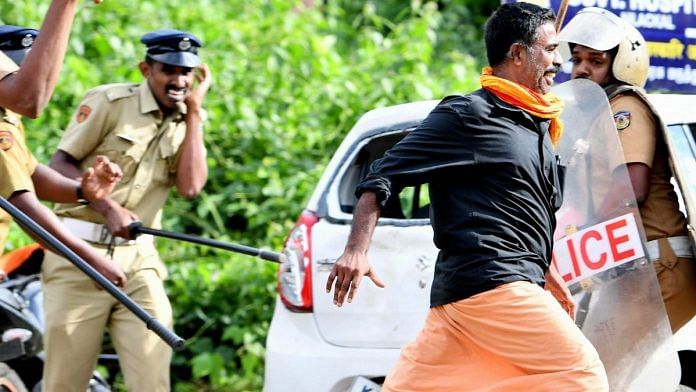Democracy is a fine balance between supremacy of law and sanctity of tradition.
The sarsanghachalak of the RSS, Mohan Bhagwat, in his traditional Vijayadashami speech in Nagpur, blamed the recent Supreme Court verdict for the unrest over the Sabarimala temple tradition in Kerala. No one expected the Communists to think clearly on religious matters, not that they have any clarity on matters other than religion either. But the tradition of millions of devotees peacefully going through the centuries-old rituals has been interrupted.
The Left government in Kerala now has its hands full with trouble.
The CPM government gave a public statement assuring everyone, including women of all ages, that complete protection will be provided to those visiting the temple. But it was caught napping when the temple gates opened. Clearly, it failed to make a realistic assessment of the situation on the ground, or understand the sensitivities of the devotees in ‘God’s own’ state.
Also read: I oppose Sabarimala verdict because this is not about women’s discrimination at all
Chief minister Pinarayi Vijayan was out of the country, but it was not known if he had nominated any other responsible colleague to tackle the situation. By default, the responsibility of dealing with the issue fell on the shoulders of the Kerala devaswom minister Kadakampally Surendran, who gleefully welcomed the Supreme Court’s judgment but did little to implement it.
The Kerala government dismissed the suggestion by the Sabarimala temple authorities, religious groups and devotees to appeal against the Supreme Court order and seek a stay and a review. But the same Kerala government wasted no time in saying that it will move the court against the central government’s order banning sale and purchase of cattle from animal markets for slaughter.
Incidentally, as minister for tourism, Surendran along with CPM’s Ernakulam district secretary P. Rajeev had earlier participated in a beef festival organised by Left-leaning Students’ Federation of India (SFI) in front of the Ernakulam Town Hall to protest the central government’s decision.
Also read: Not just a bar at Sabarimala, menstruation has got women ostracised & labelled witches
Although an individual’s food choice should be respected, Surendran’s participation in a beef party as a minister was not appreciated, especially when he was also concerned about Hindu temples. Despite being an atheist, he visited the famous Guruvayur temple in Thrissur last year and offered prayers, an act for which he was reprimanded by the party. He was warned to keep off temple visits, except as part of his duty, because “offering prayers at the temple was against party principles”. The minister had to apologise to the party for this ‘deviation’ and agreed with the view of the state committee that he had not been cautious enough to avoid an unnecessary controversy.
The Supreme Court’s order on Sabarimala is probably a fit case to analyse the issue of constitutional propriety versus the question of faith. This issue will surely crop up more often now as the Supreme Court is ruling on matters like Triple Talaq and Ram Janmabhoomi dispute. Article 14 of the Constitution says that the state shall not deny any person equality before law and will guarantee equal protection of the laws within the territory of India. This Article can be interpreted as stating that the equality before law applies to institutions and temples owned and run by the state itself, and not on temples run by independent trusts whose traditions and rituals are conducted according to age-old practices.
Similarly, Article 15 (prohibition of discrimination on grounds of religion, race, caste, sex or place of birth) clearly states that the (Article 15(2) (b)) provisions are applicable to places that “are maintained wholly or partly out of state funds or dedicated to the use of general public”.
Sabarimala is not a public place or a tourist spot; it is a unique temple with certain tantric rituals practiced over a long time. There are a number of temples with tantric rituals that are selective about the way those are practiced.
It is nobody’s argument that traditions cannot go wrong or can end up becoming a permanent practice of extending rights and privileges only to a few. Courts and governments do not create traditions and therefore need not don the mantle of dismantling the traditions. Neither does the Constitution give them the right to selectively reform only the practices of the majority community. Hindu society has the dynamism to change the traditions that have gone wrong and accept modernity without compromising with the core principles and values. Most social and religious reforms in Kerala and elsewhere in India have been achieved not by law alone but by social reformers.
Also read: At the heart of Sabarimala Temple’s bar on women lies a story of unrequited love
Democracy and governance are all about maintaining the fine balance between supremacy of law and sanctity of traditions without transgressing law or contravening traditions. Both need to change and adapt to changing times, by consensus and not confrontation.
The best course of action for the Kerala government would be to approach the court for a review of its order, leave the matter of reforming religious practices to the devotees, and remain within the secular limits of governance.
The author is former editor of ‘Organiser’.




I didn’t realize Print was a pro-BJP paper but to make sweeping statements like ” Noone expected the communists to have any clue about religious matters not that they have any clue on other matters as well’ speaks of an inherent bias and is not expected from a paper owned by Shekar Gupta.
Why is it not expected? It is an opinion piece written by sesadri chari of BJP. What is your problem about him giving his opinion? Or is it that freedom of speech is only for pseudo liberals?